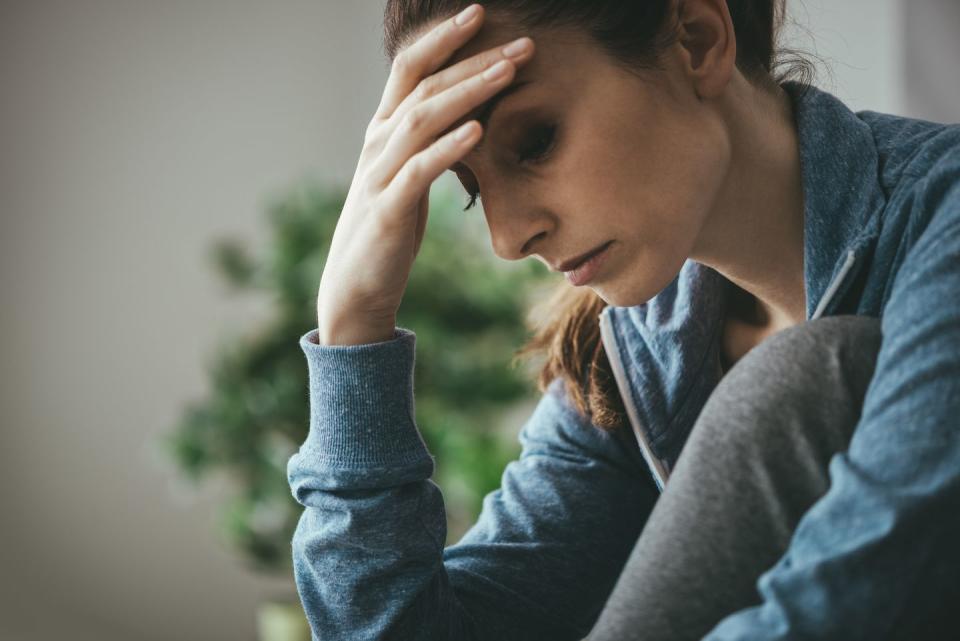6 Things That Can Make Rheumatoid Arthritis Symptoms Worse

Unlike some chronic conditions that tend to have steady symptoms, rheumatoid arthritis (RA) has moments when things worsen, followed by periods when they feel better. These flares, as periods of intense symptoms are known, can cause extreme pain, swelling, and stiffness in joints—making it hard to go about your daily activities.
But what causes those flares? That’s not a one-size-fits-all kind of question. “Rheumatoid arthritis sufferers can have a pretty diverse range of triggers—from the weather to insomnia,” says Manish Jain, MD, a Chicago-based rheumatologist. That’s why it can be so important to notice what might be bringing on your own flares. Seeing that there’s a connection between, say, moments of high stress and a worsening of your symptoms can help you take steps to avoid those triggers down the road (or at least prepare yourself if you know a flare is coming). Here are some of the most common triggers to watch out for:
1. Not getting enough sleep
RA is an inflammatory disease, and the amount of inflammation in your body can be influenced by how much sleep you’re getting, according to Dr. Jain. Research shows that sleep deprivation can raise levels of inflammatory markers while lowering pain thresholds. Since pain then causes even more sleep troubles, this can start a dangerous cycle.
This might explain why 60 percent of rheumatoid arthritis patients have trouble with sleep. There’s no perfect solution, but things like turning off electronics for an hour before bedtime and avoiding caffeine later in the day can help. It’s also important to talk to your rheumatologist about any sleep issues—there are certain RA medications that might be causing your tossing and turning and they might be able to tweak your treatment plan.
2. Mental health struggles

The more stressed out you feel, the likelier you are to have a flare. And it’s not just stress that fires up your symptoms; so do mood disorders, such as depression and anxiety. This could be due to an increase in stress-related hormones and higher levels of inflammation. “In other words, doom scrolling Twitter is not a great thing for your arthritis symptoms,” says Dr. Jain.
Those diagnosed with painful chronic diseases such as RA often benefit from talking to a therapist about their worries and fears. If you haven't worked with a mental health provider in the past, ask your rheumatologist for a recommendation for someone who has experience working with other RA patients.
3. Changes in the weather
What does a cold front have to do with your joints? A lot, actually. “This is one of the most common triggers,” says Dr. Jain. Some research shows that sunnier, less humid days result in better symptoms than rainy, more humid ones. Other research shows it’s the change in weather—so going from nice to stormy or vice versa—that brings on flares. If weather is making your flares hard to live with, talk to your doctor about what you can do to better control them.
4. Smoking

Here’s another reason to cut out cigarettes. “People who smoke have higher levels of disease activity,” says Dr. Jain. In other words, more inflammation and pain. There is good news, though: While research shows that current smokers have more RA flares, once they quit, they have the same amount as people who never smoked. There are many free resources to help you stub out your last cigarette, including SmokeFree.gov from the National Cancer Institute and QuitNow.com from the American Cancer Society.
5. Eating certain foods
There isn’t a lot of research showing specific foods can trigger flares, but many rheumatoid arthritis patients notice a connection. “Some of my patients say they feel miserable after eating certain foods,” says Dr. Jain. Research shows similar kinds of feedback, noting sufferers say things like red meat, alcohol, and soda make symptoms worse. Dr. Jain’s advice: In general, try to eat a heart-healthy diet with lots of fruits and vegetables and not too many processed foods. And if you do start to suspect there might be a diet/flare link, keep a food diary to see if there is something specific to blame.
6. Having a cold or other infection

Getting sick can start a chain reaction that leads to painful arthritis symptoms. According to Dr. Jain, infections can make your immune system even more active, making it likelier it will attack your own joints. “We also often tell patients to stop taking their rheumatoid arthritis medication if they are on antibiotics [for a cold or infection],” says Dr. Jain. “That combination can lead to flares.” It can be harder for rheumatoid arthritis patients to avoid getting sick since the medication prescribed often suppresses the immune system. That’s why it’s so important to reduce your risk, like by getting the flu vaccine every year, washing your hands frequently, and avoiding others who are ill.
No matter what triggered your flare, it’s important to talk to your doctor and get it under control as soon as you can to avoid serious damage to your joints.
You Might Also Like

